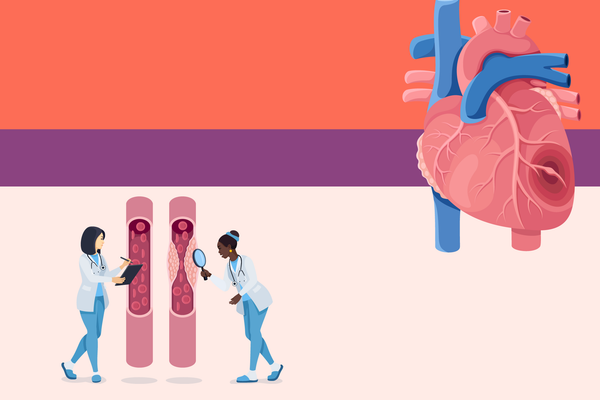Dr. Goldberg's responses have been lightly edited for clarity and length.
With all of the attention on COVID-19 these days, it's easy to forget that there are other health issues putting women at risk. In particular, heart disease poses a formidable threat to women, especially after menopause.
In fact, heart disease is still the leading cause of death in women in the United States, accounting for one in every five deaths, and the problem is even more widespread among women in the Black and Latino communities.
Experts advise that women should start paying more attention to their heart health around age 50, as their risk increases substantially at that time.
For women, aside from the normal risk factors of high blood pressure, high cholesterol and obesity (which are risk factors for both women and men), other issues have been found to play a more prominent role in heart disease, including diabetes, smoking, depression, inactivity, inflammatory diseases, pregnancy complications, a family history of heart disease and, yes, menopause. Research has found an increase in heart attacks among women 10 years after menopause.
So what's the connection between heart health and menopause? There are a variety of factors to be aware of. While no direct causal link has been found between menopause and heart disease, there's been a lot of discussion of the role estrogen plays and its impact on heart health in women.
Estrogen affects nearly every organ system in the body — it increases HDL (good) cholesterol, lowers LDL (bad) cholesterol and soaks up free radicals. Importantly, for heart health, estrogen also has a positive effect on artery walls and helps make blood vessels more flexible, and the decline in estrogen during menopause seems to have an adverse effect on blood flow.
While men and women share many of the same symptoms of a heart attack, such as chest pain and shortness of breath, women often experience more subtle symptoms, such as neck, jaw, shoulder, upper back or abdominal pain; dizziness and unusual fatigue, especially when at rest. These can be signs for what is known as a silent heart attack.
To learn more, I reached out to Dr. Nieca Goldberg, medical director for the Women's Heart Program at New York University's Langone Health and a member of HealthyWomen's Women's Health Advisory Council. In an email exchange, I asked Dr. Goldberg about heart health after menopause, and what steps women can take to mitigate their risk.
HealthyWomen: How does heart disease present itself in women?
Nieca Goldberg: In women, we find that the typical symptoms of heart attack include tightness or pressure in the chest, shortness of breath, upper abdominal pressure, fatigue and fainting or collapse.
HealthyWomen: Does the absence of estrogen put women at a greater risk for heart disease, and if so, why?
Nieca Goldberg: We've found that lower levels of estrogen can often raise blood pressure, increase weight gain and raise LDL (bad) cholesterol and triglycerides. These are common risk factors for heart disease. However, low estrogen is not the determining factor. Menopausal women who lead a healthy lifestyle, including diet and exercise can definitely lower their risk for heart disease.
HealthyWomen: What other factors can contribute to cardiovascular disease following menopause?
Nieca Goldberg: High blood pressure, high cholesterol, smoking, diabetes, obesity and low levels of HDL (good) cholesterol, a family history of heart disease and autoimmune diseases.
HealthyWomen: What about hormone replacement therapy? Can it help women improve their heart health after menopause?
Nieca Goldberg: No. Hormone replacement therapy does not prevent heart disease. This is a common misperception. We've seen that it can help reduce or prevent menopausal symptoms but not go as far as preventing heart disease. Hormone replacement therapy should only be prescribed for menopausal symptoms and never to women who have heart disease or risks for heart disease.
HealthyWomen: What preventive steps can women take to improve their heart health before and after menopause?
Nieca Goldberg: Really pay attention to your diet. Try to follow a plant-based or Mediterranean-style diet. Also, make aerobic exercise a daily routine, and if you smoke, quit. In addition, make sure you have regular checkups with your healthcare provider and have your blood pressure and glucose checked every time. There are effective medications that can help lower cholesterol and glucose. These are just a few simple steps women at any age can take to help reduce their risk.
What you can do
The threat of heart disease increases substantially after menopause, and it's a threat that should be taken seriously. However, women should remember that developing cardiovascular disease (or any health condition) is never a foregone conclusion.
You can reduce your risk by eating healthily, keeping your weight down, exercising regularly, getting enough sleep and quitting smoking if you smoke. And, most importantly, putting your health — and your heart — first.
Resources:
American Heart Association
The North American Menopause Society
- How to Take Care of Your Heart After Menopause - HealthyWomen ›
- Menopause and Your Heart - HealthyWomen ›
- How to Stay Heart-Healthy After Menopause - HealthyWomen ›
- What's Your Heart Disease Risk? Important Numbers to Know - HealthyWomen ›
- What Worries Women About Their Heart Health? - HealthyWomen ›





